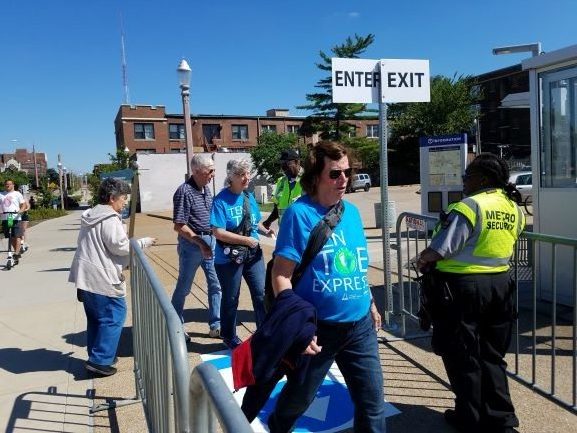While the MetroLink Access Pilot only lasted for 26 days, the project provided a snapshot of what could be with regards to access control and opportunities around the MetroLink stations for security measures. Riders, law enforcement representatives and regional stakeholders weighed in on the increased level of comfort/confidence in the system with the increased attention/presence as a part of the pilot. Citizens for Modern Transit (CMT) announced on Sept. 30 it was teaming up with Metro, East-West Gateway Council of Governments, St. Clair County Transit District, the Organization for Black Struggle and local law enforcement to pilot a MetroLink Access Project designed to help improve fare validation at three highly utilized MetroLink stations. The initiative was among multiple collaborative efforts underway across the region to prioritize and ensure safety and security on the MetroLink System. In the past year alone, there has been increased law enforcement presence on the system, commuters have been given the opportunity to download a personal safety smartphone app free of charge and an extensive MetroLink Security Audit is currently underway.
The MetroLink Access Project kicked off on Monday, Sept. 10, at the Forest Park-DeBaliviere, North Hanley and Fairview Heights MetroLink stations and ran through Oct. 5, 2018. For approximately four weeks, contracted security officers, with the support of Metro Public Safety Officers and local law enforcement, monitored and enforced fare validation for 20 hours each day. The goal was to establish a temporary access control plan that utilized personnel and environmental design changes to help better monitor and manage patrons arriving and departing from the stations with the intent of enhancing security, validating fares and building public confidence back in the MetroLink system. Each of the three stations had designated platform entrance and exit areas, so MetroLink riders were asked to follow the directional signage to help prevent delays. MetroLink riders using these project stations were also encouraged to have their passes, tickets and valid fares out before they arrive at the checkpoints so they are ready to show them to the officers.
“The temporary access control and presence of security at the stations – no matter whether a police officer, contract security or Metro public safety officer – seemed to enhance confidence in the safety of the system according to our riders and stakeholders especially when security was engaged in actively checking for valid fares and other security efforts,” said Kimberly Cella, executive director of Citizens for Modern Transit. “While we know this was only a temporary effort and very limited in scope, we were repeatedly contacted about the importance of making these types of changes more permanent. We will be advocating for a continuation of some type of access control, increased presence of all levels of security, and defined roles and responsibilities for every level of security on the system to build confidence back in the St. Louis transit system.”
One law enforcement officers commented, “The pilot program forced the guard to be at the entrance checking fares and paying attention to what was happening in the area. The interaction with riders entering and exiting also increased. Simple interactions such as this gives riders a sense of security.”
CMT included an online survey for riders as a part of the month-long program. While the sample size was small (174 respondents), eighty-one percent of the respondents felt that an ‘official’ presence on the system made them feel safer. Note the ‘official’ presence was not defined by level of security either i.e. law enforcement, Metro public safety officers or contract security.
The MetroLink Access Project was underwritten by Citizens for Modern Transit with the help of Metro.
